02/17/21
K-State Current - February 17, 2021
K-State Current is a weekly news update for the Kansas Board of Regents to apprise the Regents on a few of the many successes and achievements made by K-State faculty, staff and students.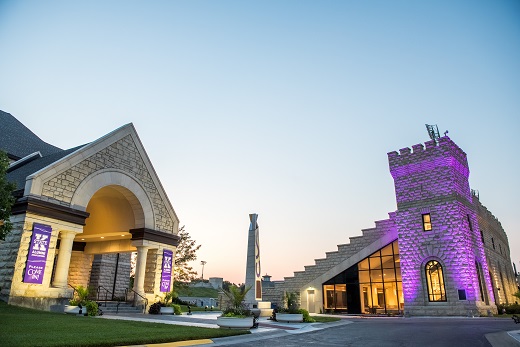
K-State News
K-State graduates report employment, continuing education success
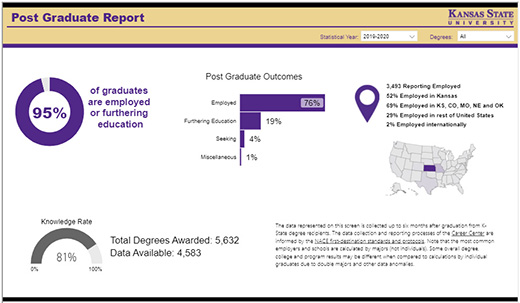 The latest post-graduation report from Kansas State University for graduates in the 2019-2020 school year finds 95% are employed or furthering their education.
The latest post-graduation report from Kansas State University for graduates in the 2019-2020 school year finds 95% are employed or furthering their education.
Even a pandemic can't stop a Wildcat from excelling in the job market.
The latest post-graduation report from Kansas State University for graduates in the 2019-2020 school year finds 95% are employed or furthering their education. Although down from the 97% reported for the 2018-2019 school year, Kerri Keller, director of the K-State Career Center, says the percentage is impressive considering the economic havoc caused by the COVID-19 pandemic, particularly for those graduating in 2020.
"It's been a time like no other for new college graduates," Keller said. "I am proud of the persistence and resilience of K-State graduates. I am also grateful for the many alumni who advocate recruiting K-State talent for their companies and organizations. It makes a world of difference for the next generations making their way from college to career."
The report, based on surveys conducted six months following a student's graduation from K-State, is good news for the state in retaining new college graduates, with 52% of K-State graduates accepting jobs in Kansas. When states surrounding Kansas — Colorado, Missouri, Nebraska and Oklahoma — are added, that amount jumps to 69%. Of the remainder of employed graduates, 29% were employed elsewhere in the U.S. and 2% employed internationally.
Starting salaries for the new graduates held steady, with the median salary at $50,000 — the same as the previous year.
The response rate to the surveys was 81%.
Leading employers of new K-State graduates include Cerner Corp., Kiewit, Textron, Geary County USD 475 and Manhattan-Ogden USD 383. More than 1,360 different organizations hired at least one K-State bachelor's graduate from the class of 2019-2020.
Of those graduates reporting placement, nearly a quarter of them were furthering their education through almost 190 different graduate or professional programs that range from accounting to veterinary medicine.
The K-State Career Center offers recruiting events that connect students with more than 800 employers. The Career Center provides support to current students and is available to new graduates throughout the calendar year as they pursue their next steps. Services are available to students in person at the Berney Family Welcome Center as well as online through the Career Center website and a variety of virtual resources.
USD 305 students can now earn an associate degree during high school from K-State Polytechnic
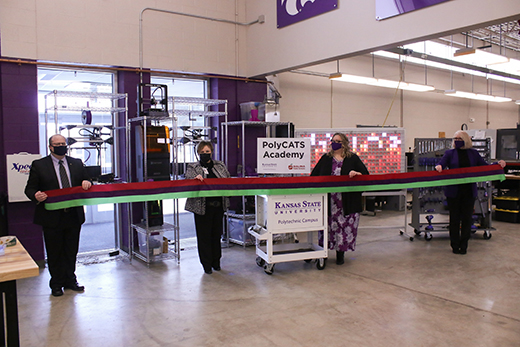 Kansas State Polytechnic and Salina USD 305 have signed a partnership to create the PolyCATS Academy for USD 305 high school students. From left are Curtis Stevens, USD 305 director of secondary education; Linn Exline, USD 305 superintendent; Alysia Starkey, CEO and dean of K-State Polytechnic; and Terri Gaeddert, associate dean for academics and student success, K-State Polytechnic.
Kansas State Polytechnic and Salina USD 305 have signed a partnership to create the PolyCATS Academy for USD 305 high school students. From left are Curtis Stevens, USD 305 director of secondary education; Linn Exline, USD 305 superintendent; Alysia Starkey, CEO and dean of K-State Polytechnic; and Terri Gaeddert, associate dean for academics and student success, K-State Polytechnic.
Kansas State University's Polytechnic Campus and Salina USD 305 have partnered to create the new Polytechnic Center for Applied Technology Studies.
This academy provides an opportunity for eligible high school students to earn industry-recognized credentials, receive college credit for general education requirements and complete dual credits for an associate degree during high school. The PolyCATS Academy will also foster strong community partnerships with businesses, community organizations and educational organizations.
K-State Polytechnic currently partners with USD 305 to offer Computing Principles, a blended credit class, at both Central High School and South High School. The course is team-taught with a USD 305 teacher and K-State faculty. Collaboration efforts also include 36 dual-credit elective offerings taught by K-State faculty.
"Kansas State University is committed to innovation in education while serving the communities in our state," said Terri Gaeddert, associate dean for academics and student success at K-State Polytechnic. "The PolyCATS Academy is an exciting new initiative that brings important stakeholders together to support the needs of our region in a collaborative manner. Students will benefit. Public schools will benefit. Businesses will benefit. This is a win-win-win approach to ensuring the needs of our workforce are met, both now and in the future."
The PolyCATS Academy will allow students to enroll in classes and receive credit from both USD 305 and K-State. Dual-credit electives will also expand from 36 to 102 courses. By the time they graduate from high school, students will have an opportunity to earn an associate degree in aviation, business or engineering technology. Other student advantages include discounted tuition rates, transitional support to college and career, networking with area employers, a collegiate connection while in high school and connections to the workforce.
USD 305 educators will benefit from the PolyCATS Academy through opportunities to work in concert with college professors, develop a greater depth of knowledge in their content areas, engage in networking opportunities and grow professionally by teaching college-level courses.
"This partnership greatly expands the choices for USD 305 students to have a post-secondary experience while still in high school," said Linn Exline, superintendent of USD 305. "The opportunity to earn college credits and an associate degree are key experiences on their road map that leads to success beyond graduation."
To learn more about the PolyCATS Academy at K-State Polytechnic Campus, contact the Office of Admissions at 785-826-2640 or polytechnic@k-state.edu, or the high school counseling departments at Central High School, 785-309-3636, or South High School, 785-309-3715.
K-State Faculty Highlights
Ben Ward, Stacey Bailey and Greg Dressman recognized as Professional Staff of the Week
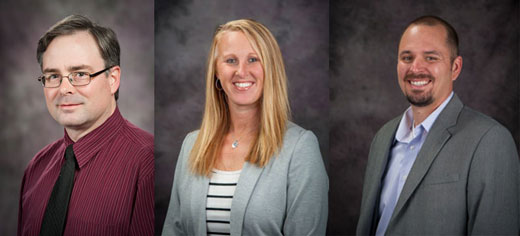 From left: Ben Ward, Stacey Bailey and Greg Dressman.
From left: Ben Ward, Stacey Bailey and Greg Dressman.
Ben Ward, instructional technologist, College of Business Administration; Stacey Bailey, assistant director of International Student and Scholar Services; and Greg Dressman, director of enterprise technology for the Division of Information Technology, were recognized as the Professional Staff of the Week at the Feb. 6 and 9 men's home basketball games, respectively. Faculty Senate, the Office of the President, K-State Athletics and the Division of Communications and Marketing wish to recognize these individuals' contributions to K-State.
Ward has worked around the clock helping faculty adapt courses to the online environment since the onset of the COVID-19 complications was thrust on us. Additionally, Ward is a passionate advocate for student learning and using technology to enhance the learning environment, not detract from it. His knowledge of learning pedagogy is amazing and he will push faculty as far as they are willing to imagine to bring innovation to online courses and campus courses. Ward has co-taught EDCI 943 Principles of College Teaching for the past 12 years with the director of the Teaching and Learning Center. He knows good teaching and he is passionate about sharing his knowledge with faculty who wish to take advantage of it and his creativity in designing interesting yet useful digital content.
Bailey is an absolute rock star. She has been working in International Student and Scholar Services since 2003. Bailey works with a high level of responsibility. She is extremely reliable and will do whatever it takes to get the job done. She is our lead immigration regulation advisor for students and works with a team of two others. In the area of regulatory compliance, she is top in the profession. She thinks critically about each situation and finds the best options or solutions. Not only does she supervise, train and mentor the other advisors, but she also keeps our students aware of their regulatory compliance. She is always on top of all the systems that need monitoring as well as individual student situations. It is imperative that SEVIS, KSIS, ImageNow and immigration advising are done at the highest of quality and she never disappoints. Along with immigration advising, Bailey supervises our graduate assistant and the international coffee hour program. She coordinates our collaborations with athletics. She also supervises the advisors on their programming responsibilities, including scholarship management, student organization advising, basic language training, and orientation. She has been around so long, she has practically done every job at some point and has a great understanding of each task.
Dressman is a key member of the Division of Information Technology team at K-State. He also serves as an architect of the cloud-first strategy and is co-chair of the Cloud Center of Excellence. After the Hale Library fire, Dressman was the calm among the storm. By 7 a.m. the morning of May 23, 2018, he and his team had a list of priorities of which services to restore and in what order. They worked to organize and lead us through bringing systems back online so K-State could function. They worked 11 days straight, with little sleep, to restore services and to strategize the future of the K-State computing infrastructure that had limited reliance on a physical data center. Since then, Dressman has led many significant efforts to move critical systems to the cloud or more redundant infrastructure. He has saved the university countless dollars in his sound approach to the cloud strategy. After the fire and the restoration of services, the next step was to conceptualize the way forward with a move of most of the machines out of Hale and a phased approach to a cloud strategy. From 1,300 virtual machines before the fire to a little more than 300 virtual machines in Hale Library in June, he created a plan and followed through with it. Most universities would have taken years to do what Dressman and his team accomplished in six months. He and his team are one of the reasons that K-State was prepared for the challenges associated with a remote workforce in March 2020.
Aleksan Shanoyan receives one of USDA's most prestigious awards
Aleksan Shanoyan is a recipient of a regional U.S. Department of Agriculture Excellence in College and University Teaching Awards for Food and Agricultural Sciences, one of USDA's most prestigious awards.
In announcing award winners, Association of Public and Land-grant Universities President Peter McPherson acknowledged the unprecedented challenges experienced by faculty in 2020. McPherson wrote, "While facing the pandemic, faculty were forced into rapidly changing and evolving teaching, research and outreach strategies. This year's winners exemplify adaptability — they allow institutions to build resilience and embrace innovative approaches to reaching students and society."
An associate professor for K-State's agricultural economics department since 2012, Shanoyan teaches courses in agribusiness economics and management to undergraduate and graduate students where he combines real-world problem-based learning activities with computer-aided real-time learning assessment tools.
Outside the classroom, Shanoyan's dedication to student success is reflected in his involvement in a wide range of advising and extracurricular activities. He serves as a co-advisor of Agricultural Economics Club, has advised student research projects for the Center for Risk Management Education and Research, served as a mentor for undergraduate students in the K-State Research and Extension Multicultural Summer Research Fellowship program, advises K-State Agricultural Economics Graduate Student Case Study Competition teams, serves as an academic advisor to undergraduate students and supervises graduate student thesis and dissertation research.
Shanoyan is also actively involved in research on teaching and learning and is a frequently invited contributor to teaching workshops and mentoring programs organized by university and professional associations. He has received numerous teaching awards, including the 2016 Outstanding Undergraduate Teaching Award, Less Than Ten Years' Experience from the Western Agricultural Economics Association, and 2017 Distinguished Teaching Award: Less Than Ten Years' Experience from the Agricultural and Applied Economics Association.
Shanoyan earned a bachelor's degree in economics and accounting from the Armenian Agricultural Academy, a master's degree in agricultural economics from the University of Illinois, and a doctorate in agricultural, food and resource economics from Michigan State University.
K-State Student News
Student-driven project leads to new foods from sorghum, wheat
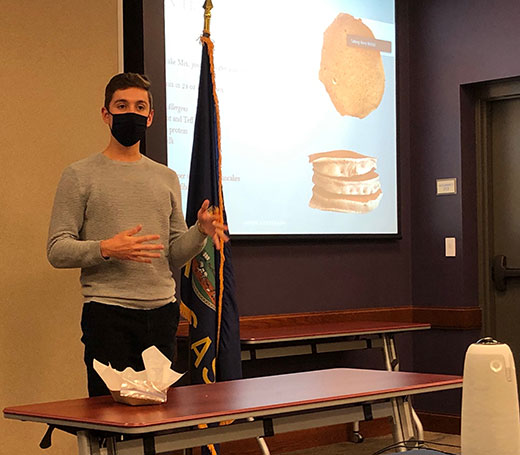 K-State senior Jaden Castinado explains a gluten-free pancake mix that he helped develop during a Fall, 2020 class. (Photo courtesy of Kansas Department of Agriculture)
K-State senior Jaden Castinado explains a gluten-free pancake mix that he helped develop during a Fall, 2020 class. (Photo courtesy of Kansas Department of Agriculture)
Kansas State University senior Christy Vavra has a pretty easy way to let her friends and classmates know what she’s been doing in her food science classes recently.
Take them to breakfast.
Vavra is one of 17 students who recently developed novel foods as part of a partnership between K-State’s Department of Grain Science and Industry, the Center for Sorghum Improvement and the Kansas Department of Agriculture.
The groups have been exploring possibilities for using grain sorghum and wheat in developing new food products. The KDA has provided funds through the USDA’s Agricultural Marketing Service’s Federal State Marketing Improvement Program, as well as mentoring and marketing support.
Listen to an intervew by Eric Atkinson on the weekday radio program, Agriculture Today
Kerry Wefald, marketing director for the KDA, said sorghum and wheat were chosen because of their abundance in Kansas. In 2019, she notes, both crops ranked No. 1 in U.S. production. “We are always working to secure ways to promote our agricultural commodities,” Wefald said, “and both of these sectors have indicated an interest in diversifying markets.”
Vavra and classmate Emmalee Gragg led work in developing a gluten-free breakfast waffle sandwich – made from sorghum -- that was selected as a product to be served in K-State’s Kramer dining hall.
Developing the sandwich “was much more interesting for us knowing that there was already an end-user out there instead of developing a product and hoping to get it into the stores,” Vavra said.
Food science associate professor Kelly Getty said the students in her class, Research and Development of Food Products, were given a challenge at the beginning of the Fall, 2020 semester to create a baked item that had wheat or sorghum as its primary ingredient.
The students chose their class projects from one of four categories: a baked food for students at the university recreation center; a par baked bun; a product for child nutrition; or, according to Getty, “something out of the box.”
“As a group, we voted on ideas to pursue and in the end there were 13 products that are in one of the product development phases – concept to an actual food item,” she said.
Nine products are being scaled up and will be served to students in Kramer dining hall. In addition to Vavra’s waffle sandwich, some of the products offered include a tomato basil bun, gluten-free pancake mix and a vegetable cracker for kids.
Each product received many rounds of testing and feedback from students, professors, KDA staff and others. Kelly Whitehair, the menu and recipe development coordinator for K-State’s Housing and Dining Services, also was a key contributor.
Sarah Sexton Bowser, the managing director of the Center for Sorghum Improvement at K-State, said testing the products with college students was an important part of the process.
“College students are still in a formative stage in determining their own preferences and food experiences,” she said. “This project is an opportunity to showcase Kansas grains and commodities in their menus and on their pallets during the formative years.”
The project is in the first of three years to develop sorghum- and wheat-based foods. K-State assistant professor of cereal chemistry Yonghui Li is conducting research to develop technologies that will extract phenolic compounds from some specialty sorghums.
“The sorghum extracts interact with gluten proteins and starch when mixed with wheat flour and water during dough development,” Li said. “This will be useful for improving low-protein wheat flour when a stronger dough is more desired.”
Getty said K-State students in the 2021 fall class will focus on grain-based entrees, and the following year’s class will take on snack products.
The groups are now working to add the new food choices in the dining centers at other Kansas Board of Regent schools. Officials in the food service program at the University of Kansas already are on board.
“We are just pleased to partner and have the innovation of the next generation of food scientists working with sorghum and wheat to develop food items that their generation will most likely embrace and purchase in the grocery store, or out in the restaurant and retail markets,” Wefald said.
Sexton Bowser added: “It’s been a great project to see these individual entities and persons come together, contribute feedback from their vantage point and provide an end product that is allowing us to shape the student experience and create markets for Kansas grains.”
Vavra, who will graduate this May, figures the experience has given her a head start in her career.
“It was the highlight of my semester,” she said. “We had such ownership in what we were doing because it does matter.”